
(Matthew 16:13-23)
May these words of this Peter be like a rock,
not a stumbling block!
|
|
"Who do you say
that I am?" Jesus asked. Simon Peter answered, "You
are the Messiah, the Son of the living God." And Jesus
answered, "Blessed are you, Simon son of Jonah! ... You are
Peter (petros), and on this rock (petra)
I will build my church..." Jesus then began to speak of
the rough road ahead. And Peter took him aside and rebuked him... "Get
behind me, Satan!" Jesus replied. "You are a stumbling
block..." (Matthew 16:13-23) May these words of this Peter be like a rock, |
"The Wisdom of
the Vine"

Message preached May 18, 2003
Long Green Valley Church of the Brethren
Glen Arm, Maryland USA
based upon John 15:1-8
"You
viperís brood!" Thatís what I called nearly 700 people over the last 3
weekends, portraying John the Baptist in Godspell.
How often do you get to curse at folks and have them applaud? As epithets go,
thatís not all that degrading to 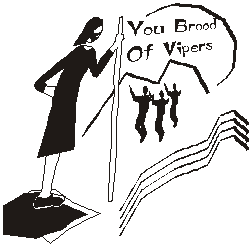 modern
ears - "you bunch of little, itty-bitty snakes." Of course, the
offspring of a viper can also bite and inject deadly poison. Hmm.
modern
ears - "you bunch of little, itty-bitty snakes." Of course, the
offspring of a viper can also bite and inject deadly poison. Hmm.
As part of
that same speech, I also repeated the prophetís warning that "Already,
the axe is laid to the roots of the trees, and every tree that does not produce
good fruit will be cut down and thrown into the fire" (Matthew
3:7-12). To me, thatís a harsh statement which carries more venom
than merely calling someone a bad name. At this stage in life, I wonder more
about what kind of fruit I bear, or whether Iím bearing any fruit at all. I
have a sneaking suspicion that this question is asked with increasing frequency
the further one travels down this road called "life."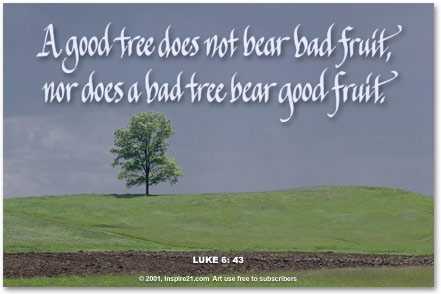
At earlier points along the way, we arenít as focused on the "harvest" end of things. Our "tree," figuratively speaking, is still growing in all the obvious ways. As we first begin to bear our fruit, itís all brand new to us - whether weíre talking about the things we may accomplish, or the children to whom we may give birth. And then, before we realize it, our tree is not what it once was. When the wind blows, our limbs groan.
For the
most part, youíve laughed with me as I joked about having to dance in Godspell.
The problem for me was not just a matter of being born with two left feet. It
also involved body parts that donít behave as they once did. I have marveled
at how effortlessly (or so it seemed) my brother-in-Christ Mark could quickly
pop up and down on stage. I have to make strategic use of my arms and hands when
getting up from the floor, listening to my left knee complain every time. Of  course,
my "friends" Icy-Hot ģ and Ibuprofen
have helped.
course,
my "friends" Icy-Hot ģ and Ibuprofen
have helped.
When it comes to the question of bearing fruit along the journey of age, weíre not just talking about physical limitations. Granted, there is a hill all of us climb along the way of our development. Once we reach the top, we canít stay there forever. The journey leads onward. I donít want to say "downhill," but sometimes it sure seems that way. Certainly, our bodies start giving in to gravity, in spite of every good effort we may undertake to stay fit and trim (well, some of us). Recent studies show that our minds naturally lose their sharpness the older we get.
Now,
growing older is not necessarily a bad thing. As the saying goes, Ďit sure
beats the alternative.í Indeed, there are more aches and pains along the way.
But, as the recent issue of Newsweek asserts, the problem of pain is not
just for those of us of older years ("Small
Patients, Big Pain," 5/19/03, vol. 141, no. 20, pp.54-61).
Chronic pain affects millions of children in our nation 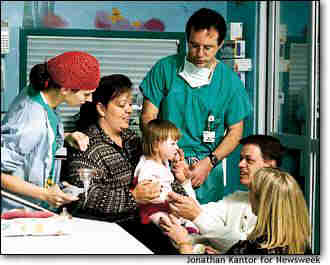 as
well. Every stage in life has its difficulties. Even so, positive possibilities
are also present for each and every one of us, no matter what our age.
as
well. Every stage in life has its difficulties. Even so, positive possibilities
are also present for each and every one of us, no matter what our age.
A basic question we face all along the way, thoí, has to do with the fruit we bear in life. Are we bearing good fruit, or is our fruit less than tasty? Of course, we each hear that question differently. The truth is, however, that in this life we never graduate beyond the fruit-bearing stage. Furthermore, even after we breathe our last breath and move beyond this life , even then there is a promise of fruitfulness. When the Bible envisions the new heaven and earth, at the center is a tree - which bears "twelve kinds of fruit," a heavenly Ďfruit of the month clubí (look it up: Revelation 22:1-2). "And the leaves of the tree are for the healing of the nations."
As for
bearing fruit in the here and now, the words of John the Baptist still sting
more than any "brood of vipers" name calling. An "axe
is laid at the roots of the trees," he said long ago. Itís ready to
cut down unfruitful trees and place t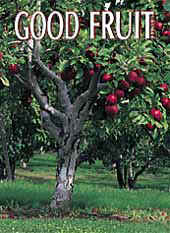 hem
in the fire. That image is likewise part of the picture the Bible paints of the
hereafter, where those who do not bear good fruit will be tossed in "the
lake of fire" (Revelation
21:8). So, this important question remains with us throughout the
journey of life - are we bearing fruit, and is that fruit good? This
question leads us toward the wisdom of the vine.
hem
in the fire. That image is likewise part of the picture the Bible paints of the
hereafter, where those who do not bear good fruit will be tossed in "the
lake of fire" (Revelation
21:8). So, this important question remains with us throughout the
journey of life - are we bearing fruit, and is that fruit good? This
question leads us toward the wisdom of the vine.
Now, true
wisdom recognizes that we are capable of bearing both good and bad fruit. Those
of you who saw Godspell
for the first time with our Valley Fellowship Players rendition of it, may have
been a bit startled by how the character I portrayed encompassed both John the
Baptist and Judas the betrayer. T his
was intentional on the part of those who wrote this musical. On the one hand, I
prepared the way of the Lord - good fruit. On the other hand, I had a
significant role in crucifying Jesus - bad fruit. The wise know the darker side
of who they are, even as they seek to live in the light of Christ. The potential
is there for both.
his
was intentional on the part of those who wrote this musical. On the one hand, I
prepared the way of the Lord - good fruit. On the other hand, I had a
significant role in crucifying Jesus - bad fruit. The wise know the darker side
of who they are, even as they seek to live in the light of Christ. The potential
is there for both.
As we age, many of us grow in our ability to see our fruit for what it is. We can observe the color, the shape, the taste of the fruit we bear in ways we could not at a younger age. We move beyond seeing everything as "either/or" - either my fruit is good or itís bad, no in-betweens. The older we get, however, the more we can see both the good and the bad within ourselves. The young man who sees everything as black and white and thinks he knows it all, gives way to a father who is able to see shades of grey but acts with a firm hand because of what might happen if he does not. Then, later in life, comes the grandfather who notes the color in it all and adds the wisdom of "perhaps," "maybe," and "yes, but." How many times have you heard the words, "if I had to do it all over again..."?
Of course,
growing older does not necessarily guarantee that weíll grow this wise. Iíve
known my share of crotchety old folks who talk about the "good old
days" without an awareness of the bad fruit of the past, who continue to
see the world 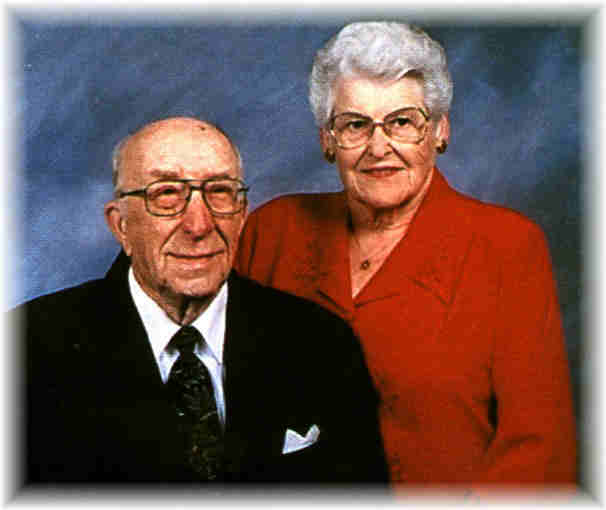 and
themselves through black and white lenses. However, the wise ones to whom I look
as my elders are those who help me, at my present stage in life, to see what I
cannot see on my own. When I look at my children and see bad fruit (Iím
speaking figuratively here, Caitlin and Tyler), I need to hear that older voice
of wisdom say, "just wait and see." The same is true when I look at my
own fruit, or seeming lack thereof.
and
themselves through black and white lenses. However, the wise ones to whom I look
as my elders are those who help me, at my present stage in life, to see what I
cannot see on my own. When I look at my children and see bad fruit (Iím
speaking figuratively here, Caitlin and Tyler), I need to hear that older voice
of wisdom say, "just wait and see." The same is true when I look at my
own fruit, or seeming lack thereof.
Now, donít
misunderstand me. Iím not building a case for putting up with bad fruit. Itís
just that those words of Jesus which Sue Ellen read earlier sound different at
the various stages we may find ourselves in life. He spoke of the true vine and
the fruit we bear, and how God is the vinegrower who removes every branch that
bears no fruit (or, might we add, bad fruit). The older we get, the more we grow
- I believe - to appreciate the hand of that vinegrower, who shifts from being
the authority figure against whom 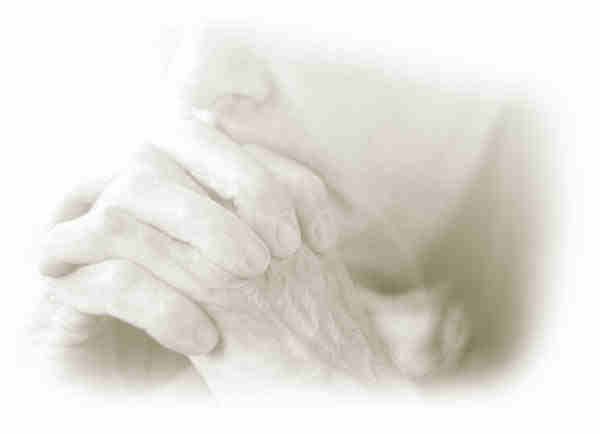 we
may rebel, or to whom we might appeal when the vineyard seems to be going bad.
Itís my hope that we grow to cherish the wisdom of this One who knows how to
prune it all.
we
may rebel, or to whom we might appeal when the vineyard seems to be going bad.
Itís my hope that we grow to cherish the wisdom of this One who knows how to
prune it all.
I mentioned earlier the aches and pains that come with age. Some of us experience a great deal more than others. It is all-too-easy to dump false wisdom on those who hurt. However, I wonder if, amid it all, we can catch a glimpse of the hand of the vinegrower. I get frustrated when I pray with those who hurt and God doesnít take away their pain. Perhaps, just perhaps, there is pruning or grafting happening in the process - vinedressing that you or I canít see - which is truly healing the vine and its branches and making for growth. Perhaps.
Now, I
know my bad fruit is all mixed up with my good fruit, and I canít always tell
the difference. The pruning sheers in my own hands might cut off too much or too
little. And then, when it comes to grafting in other branches - as can be done -
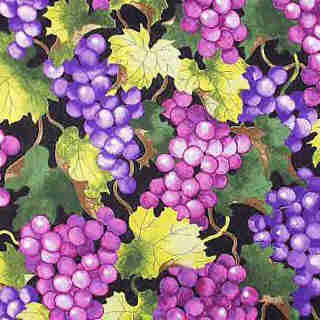 Iím
often at a loss, because I canít see the whole plant from my perspective. But
God can. This vine belongs to the Lord.
Iím
often at a loss, because I canít see the whole plant from my perspective. But
God can. This vine belongs to the Lord.
We never stop growing, and - really - we never stop bearing fruit, no matter what age we may be. The latter is something I canít say enough. The older we get, however, the more our growth is qualitative, not quantitative. The fruit of our "elders," a word I hope we never get rid of in this overly youth-conscious society, comes through the flavor of wisdom. However, it is not wisdom imposed. We donít bestow what we know as if weíre dump-truck drivers pulling a lever so it all can just land on top of those younger than us. People stop paying attention to that kind of wisdom, donít they? The good fruit of our elders is best shared suggestively. The true wisdom that comes with age offers nuggets that whet the appetite and suggest other possibilities.
We never
stop growing. We never stop bearing fruit. Our fruit is just different as we
age. The knee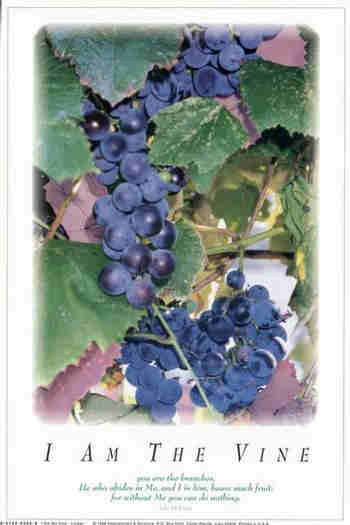 may not be able to bend as it once did, but the heart can and does, often in
very colorful ways. Thatís good news. You can always bear good fruit, even as
you grow more aware of the lesser fruit you also bear. Furthermore, God remains
at work pruning, and the vine is in his hands. In fact, Jesus said, "I
am the vine."
may not be able to bend as it once did, but the heart can and does, often in
very colorful ways. Thatís good news. You can always bear good fruit, even as
you grow more aware of the lesser fruit you also bear. Furthermore, God remains
at work pruning, and the vine is in his hands. In fact, Jesus said, "I
am the vine."
"I am the vine." Therein lies wisdom. You see, no matter what stage we find ourselves in life, no matter how old we are, no matter where we are on this journey, we can easily lose our focus. We can think it all depends upon us, that weíre the whole plant and thatís all there is to it. Or, we can despair, believing that weíre rootless, unconnected, alone, cut off from the source. Or, we can see only as far as our own leaves, and the fruit that is just on our own particular branch, whether that fruit is good or bad, those leaves healthy or diseased.
Wisdom comes as we see ourselves connected to Jesus. He is the vine. Abiding in him means listening to his Word in scripture and prayer, drawing in the moisture we need daily, the sustenance we require if we are to live. I love the words to that song we sang leading up to our morning prayer. Though Godspell put them to a new tune, the text to this old hymn goes back 800 years, attributed to St. Richard of Chichester.
|
"Day by day, dear Lord |
Simply put, thatís the wisdom of the vine in one sentence - a suggestive nugget through which the vinegrower prunes and grows this vine. In this way, one day at a time, throughout our journey through this life and beyond, we bear good fruit ... and thus glorify God.
| online resources for this scripture text |
For commentaries consulted, see John. |
©2003 Peter L. Haynes